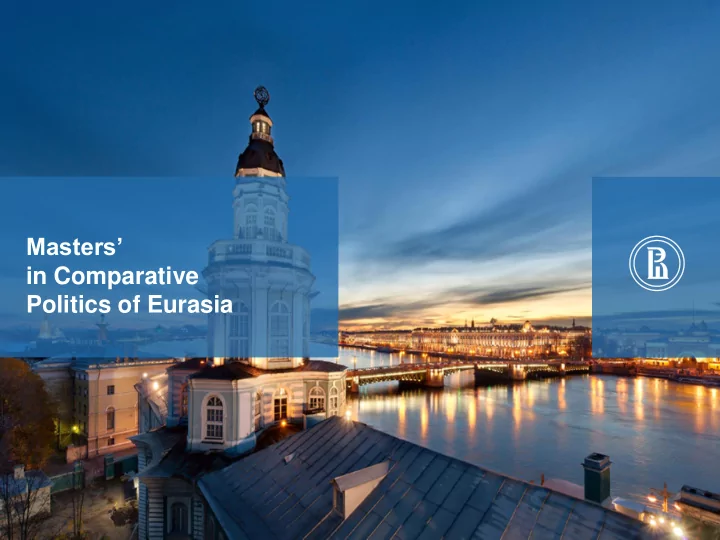

Masters’ in Comparative Politics of Eurasia GAJAH ANNUAL REPORT 2015 | 1
About programme The HSE St. Petersburg Masters Programme in Comparative Politics of Eurasia responds to the growing strategic importance of the wider Eurasian region, including the former Soviet Union and the countries of East Asia: • disciplinary focus on Comparative Politics, • geographical focus on Eurasia.
Curriculum. Key segments (120 credits) Comparative political science theory; Methods of political science research; Politics and society in Russia; Social and political transformations of Central and East Asia; International relations and geo-political standing of Russia, Central and East Asia; Russia’s geo -political standing in Arctic . region.
Core (19 credits) Intro into Comparative Politics: Comparative Political Institutions (3 credits) Postcommunist Politics and Society (4 credits) Public Choice and Public Policy (4 credits) Media in Contemporary Politics and Society (4 credits)
Methods (11 credits) Research Methods in PolSci I (quantitative) (3 credits) Research Methods in PolSci II (qualitative) (3 credits) Computational Text Analysis or Social Network Analysis (5 credits)
Electives (minimum 38 Political Economy of Post-communist credits) Transformation (5 credits) Russia in World Politics (5 credits) Russia’s Electoral Politics: Comparative Perspective (5 credits) Nations and Nationalism in USSR and Russia (5 credits) Russia’s Civil Society: Comparative Perspective (4 credits) Conflict in the EU-Russia Relationship (4 credits) East Asia: Politics and Society (4 credits) Post-Soviet Central Asia: Politics and Society (3 credits) Russia in Arctic Region (3 credits)
Research (52 credits) Research/dissertation seminar (16 credits) Internship (12 credits) Master Dissertation (24 credits)
Graduate Student Research Opportunities Interdisciplinary research centres, ongoing projects and seminars offer a stimulating research environment within which to develop the Masters’ dissertation. .
Internships and Student Mobility The programme will provide all necessary assistance for identifying research/practice- oriented internship placements as well as opportunities for study abroad. .
Programme’s Location The Programme’s location in St. Petersburg with its extraordinary cultural and historical heritage will provide students with unique opportunities for cultural enrichment, historical . understanding and the learning of Russian language.
Prospective Students Accessible to good students from all academic backgrounds and with different professional experiences. .
Career prospects • Public or private sector; • Academia, • Think tanks and business consultancies, • Political consultancy, • Government and international organizations, • NGOs, • Media and journalism, • Diplomacy. .
Global market International demand for academics and professionals in this field is to increase due to: • dynamic change in global affairs, • growth of Asian societies, • dynamic institutional development and economic growth in new global regions. .
Why MiCPEA? The only Russia’ international Master’s in Comparative Politics Unique expertise in Russian and Postcommunist politics High level of research methods training Unique network of international partners
Fees and Funding The full tuition is 240 000 rubles (per year), though a variety of scholarships are available for both Russian and international students. .
THE Programme’s FACTS 2 years Full-time Programme Academic Director Language of Contacts Instruction English Dmitry Goncharov, dgoncharov@hse.ru Professor, Department of Political Science, HSE St. Petersburg
Masters’ in Comparative Politics of Eurasia
Recommend
More recommend